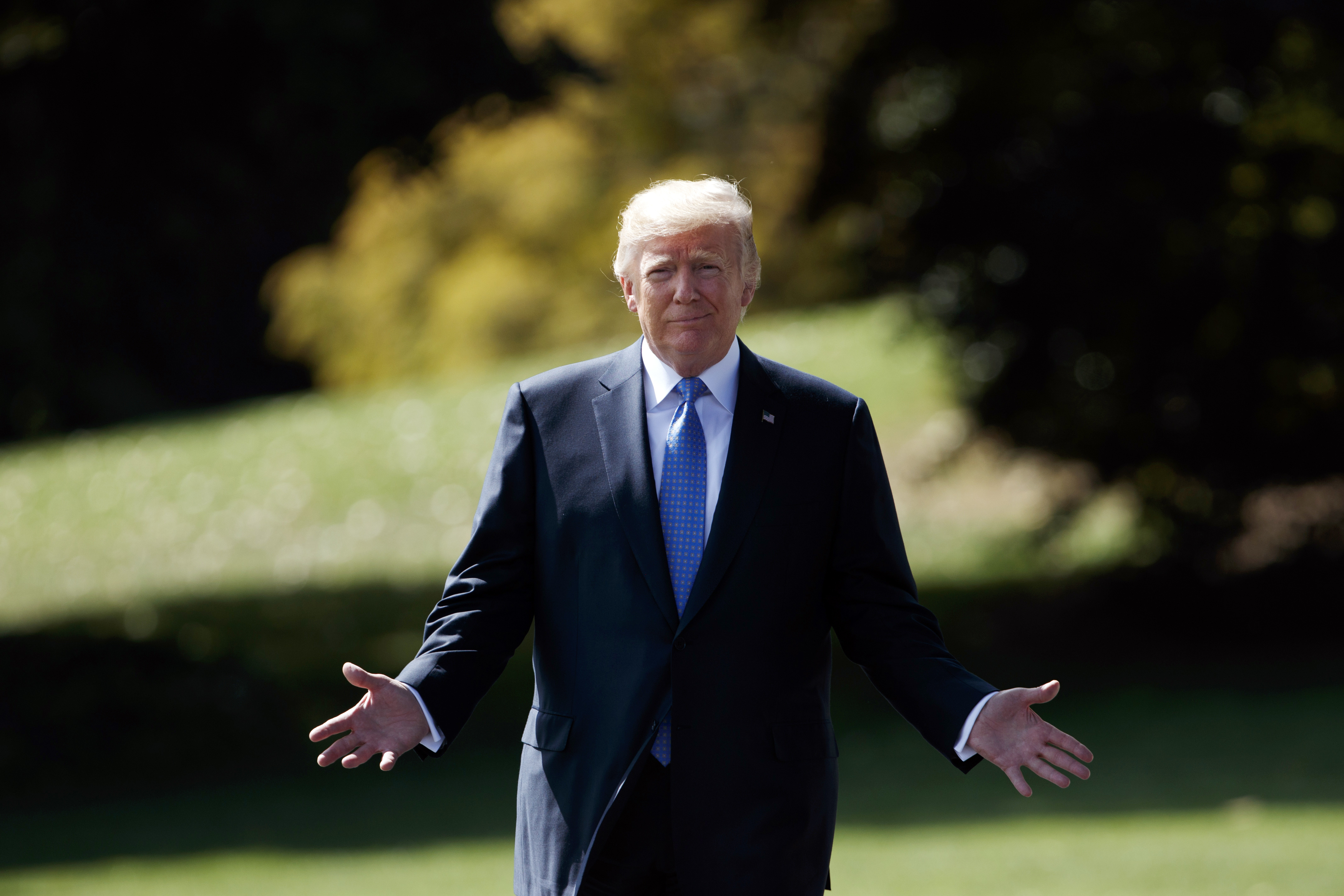
The dangers of obsessively and reflexively hating all things trump
- Select a language for the TTS:
- UK English Female
- UK English Male
- US English Female
- US English Male
- Australian Female
- Australian Male
- Language selected: (auto detect) - EN
Play all audios:

Donald Trump's utterly appalling presidency somehow hit a new low on Wednesday, when he retweeted a British fascist (who has been charged with "causing religiously aggravated
harassment") who had posted videos of Muslims, especially immigrant ones, supposedly committing crimes. The clear and obvious intent was to whip up hatred by holding 1.8 billion people
responsible for the alleged crimes of individual Muslims. (In at least one of the videos the perpetrator was not even a migrant, as the tweet had said.) In terms of racist hatemongering, it
is in all important respects identical to the Nazi "Der Jude" posters. The president of the United States boosting this diseased racist propaganda quite understandably taints
everything else he says and does. However, even this galling behavior doesn't mean that President Trump's views are 100 percent bad all the time. Similarly, the enemy of your enemy
is not necessarily your friend — and it's important not to side with bad actors just because they happen to fall afoul of the president's meandering, addle-brained resentments.
Case in point: the proposed merger between AT&T and Time Warner, which Trump's Department of Justice has filed a lawsuit to block. SUBSCRIBE TO THE WEEK Escape your echo chamber.
Get the facts behind the news, plus analysis from multiple perspectives. SUBSCRIBE & SAVE SIGN UP FOR THE WEEK'S FREE NEWSLETTERS From our morning news briefing to a weekly Good
News Newsletter, get the best of The Week delivered directly to your inbox. From our morning news briefing to a weekly Good News Newsletter, get the best of The Week delivered directly to
your inbox. Quite a few liberals have been supporting this merger on what amounts to knee-jerk anti-Trump animus. Bloomberg's Joe Nocera wrote a column along these lines entitled
"I Never Root for Megamergers, But Go, AT&T-Time Warner!" The Atlantic's Julia Ioffe worried that preventing the merger might be the first step in Putinesque domination of
the entire free press. Larry Summers, former secretary of the treasury under President Clinton and director of the National Economic Council under President Obama, argued that "the
Trump administration’s selective economic punishment of political opponents is a targeted attack on our democratic values." But the liberal case against the merger is actually quite
strong, as my colleague Jeff Spross argues. There is every reason to think that this sort of vertical integration will result in less choice and higher prices for consumers, not to mention
higher executive pay and shareholder kickbacks. The pro-monopoly bias that conservatives like Robert Bork built into anti-trust law in the 1970s by raising a near-impossible burden of proof
to prevent mergers has come under intense scrutiny of late, because it is a complete crock. Contrary to the whining of AT&T boss Randall Stephenson that DOJ's suit "defies
logic" and is "unprecedented," back in the New Deal days these sort of vertical integrations (where a communications company is buying a content company) were forbidden as a
matter of course, and America was better off for it. There is precisely zero reason to assume that either AT&T or Time Warner gives a single solitary whit for the freedom of the press.
This merger is about rolling up monopoly control over American TV and internet customers to soak them for maximum possible profit with the least possible work. That goes for CNN too (owned
by Time Warner and the possible rationale for Trump blocking the merger). Far from being a beacon of admirable independent journalism, CNN continually embarrasses itself. It continues to
employ the plagiarist Fareed Zakaria but fired Reza Aslan for swearing about Trump. It gave Trump gobs and gobs of free coverage during the campaign (often showing live coverage of his
speeches even before he got there) and hired his goons Jeffrey Lord and Corey Lewandowski — the latter of whom was caught on tape allegedly assaulting a journalist before he was hired, as
well as continuing to take money from the Trump campaign while working for CNN. (Lord was fired after he tweeted "Sieg Heil" at a Media Matters staffer, while Lewandowski quit
after the Trump victory.) There's little reason to think that allowing this merger to go through will meaningfully protect democratic values. It also seems reasonable to suppose that
leaving the companies as they are won't further hurt such values either — and will also prevent market monopolization that would lead to certain abuse of customers. Now, that is not to
say that the potential political motivations for the DOJ action should not be investigated. Trump has indeed displayed a frankly rather bizarre anti-CNN bias. (My theory is that CNN is about
the only non-Fox News channel that the president regularly watches, and it makes him mad because it's not one show after another of utterly shameless pro-Trump agitprop.) And the
rationale for blocking the merger is squarely at odds with the Federal Communication Commission's recent decision to dynamite net neutrality regulations. These motivations aren't
mutually exclusive either, of course. Indeed, perhaps the most plausible explanation here is that Trump has a chip on his shoulder about CNN's supposed FAKE NEWS, directed his staff to
come up with some pretext to stop the merger, and they found a perfectly reasonable one sitting in plain sight. Only one thing is for sure: Liberals should stop giving cover for corporate
CEOs to hide their selfish motivations under a cover of joining #TheResistance. These people care about nothing but their own profits. Liberals, remember: Trump's enemies are not
necessarily your friends.
